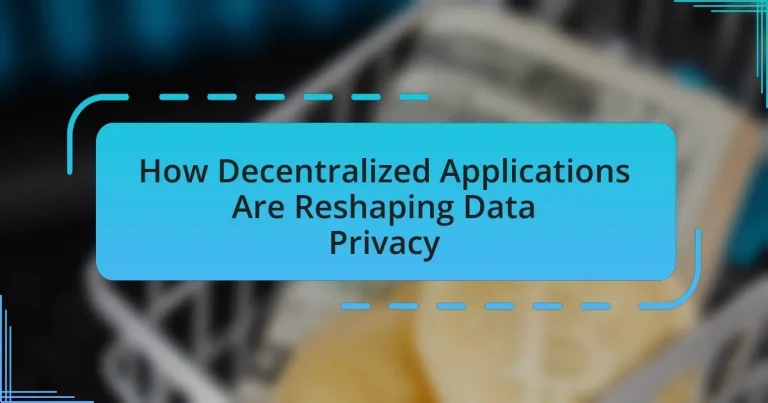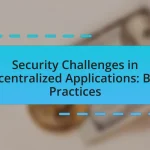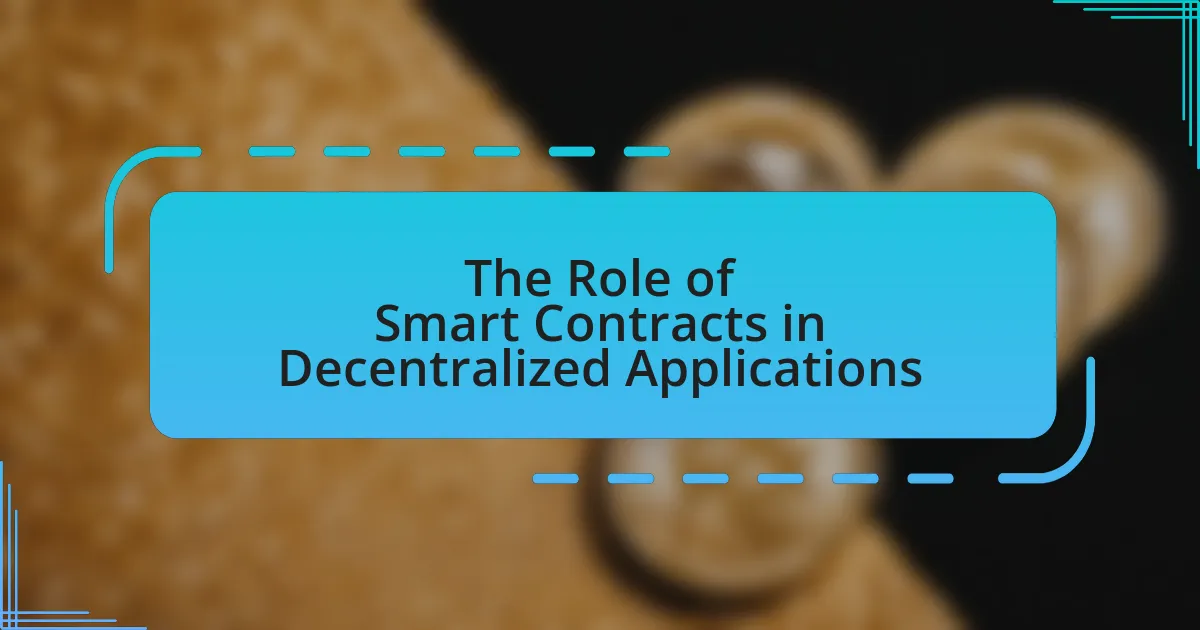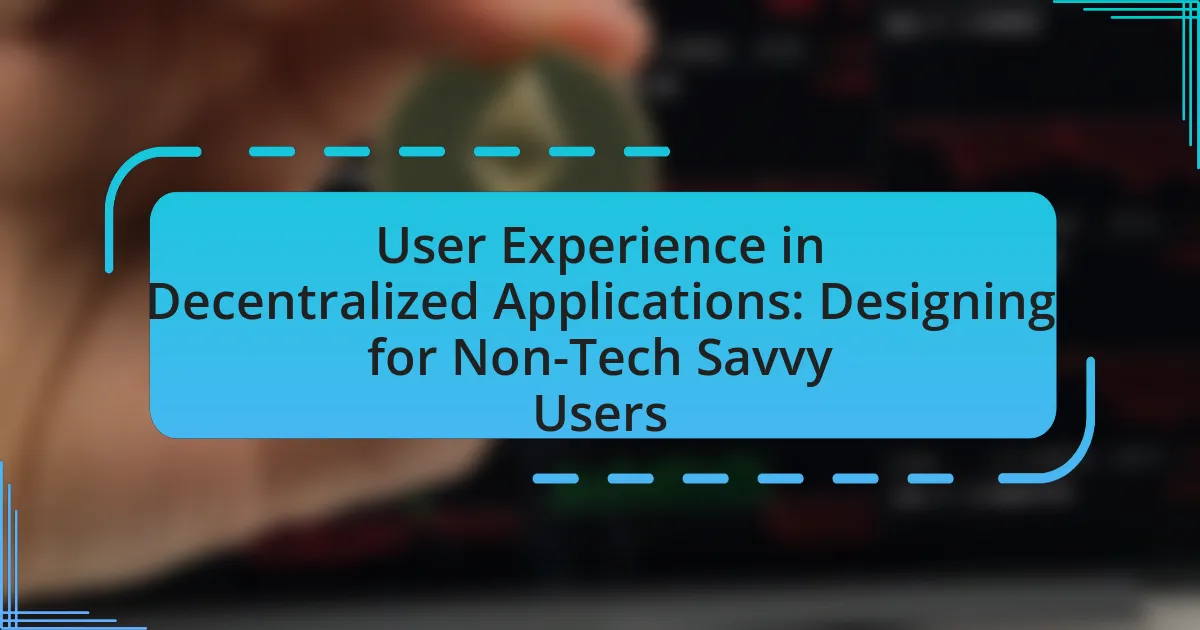Decentralized applications (dApps) are transforming the landscape of data privacy by allowing users to maintain control over their personal information through blockchain technology. Unlike traditional applications that rely on centralized servers, dApps distribute data across a network, reducing the risk of unauthorized access and data breaches. This article explores the fundamental differences between dApps and conventional applications, the technologies that underpin them, and the importance of data privacy in today’s digital world. It also addresses the challenges and limitations of dApps, user responses to their adoption, and future developments that may enhance data privacy while complying with regulatory standards.
How are Decentralized Applications Changing the Landscape of Data Privacy?
Decentralized applications (dApps) are fundamentally altering the landscape of data privacy by enabling users to retain control over their personal information. Unlike traditional applications that store data on centralized servers, dApps utilize blockchain technology to distribute data across a network, minimizing the risk of unauthorized access and data breaches. This decentralized architecture ensures that users can interact with services without exposing their sensitive information to a single point of failure. For instance, a study by the World Economic Forum highlights that blockchain can enhance data security by providing immutable records, which are resistant to tampering. Consequently, dApps empower individuals with greater privacy and security, fostering a more trustworthy digital environment.
What are Decentralized Applications (dApps)?
Decentralized Applications (dApps) are software applications that run on a blockchain or peer-to-peer network, rather than being hosted on centralized servers. dApps utilize smart contracts to facilitate transactions and operations without the need for intermediaries, ensuring transparency and security. The decentralized nature of dApps enhances user control over data and privacy, as they eliminate reliance on a single entity to manage user information. This is evidenced by the growing adoption of dApps in various sectors, including finance and social media, where they provide users with greater autonomy and protection against data breaches.
How do dApps differ from traditional applications?
Decentralized applications (dApps) differ from traditional applications primarily in their architecture and control mechanisms. dApps operate on a blockchain or decentralized network, which allows for greater transparency, security, and user control over data, whereas traditional applications typically rely on centralized servers controlled by a single entity. This decentralization reduces the risk of data breaches and enhances privacy, as users retain ownership of their data rather than relinquishing it to a central authority.
What technologies underpin decentralized applications?
Decentralized applications are primarily underpinned by blockchain technology, smart contracts, and peer-to-peer networking. Blockchain technology provides a distributed ledger that ensures transparency and immutability of data, which is essential for trust in decentralized systems. Smart contracts automate processes and enforce agreements without intermediaries, enhancing efficiency and security. Peer-to-peer networking facilitates direct interactions between users, eliminating the need for centralized servers and reducing points of failure. These technologies collectively enable decentralized applications to operate in a secure, transparent, and efficient manner, fundamentally reshaping data privacy by giving users greater control over their information.
Why is Data Privacy Important in Today’s Digital World?
Data privacy is crucial in today’s digital world because it protects individuals’ personal information from unauthorized access and misuse. With the increasing amount of data generated online, breaches can lead to identity theft, financial loss, and erosion of trust in digital services. According to a 2021 report by IBM, the average cost of a data breach is $4.24 million, highlighting the financial implications of inadequate data privacy measures. Furthermore, regulations like the General Data Protection Regulation (GDPR) emphasize the importance of data privacy by imposing strict guidelines on data handling, reinforcing the need for organizations to prioritize the protection of user data.
What are the current challenges to data privacy?
Current challenges to data privacy include increasing data breaches, lack of regulatory compliance, and the rise of surveillance technologies. Data breaches have become more frequent, with a report from IBM indicating that the average cost of a data breach reached $4.24 million in 2021. Additionally, many organizations struggle to comply with evolving regulations like the GDPR and CCPA, which can lead to significant legal and financial repercussions. Surveillance technologies, including facial recognition and tracking software, pose further risks by enabling unauthorized data collection and monitoring of individuals without their consent. These factors collectively undermine individuals’ control over their personal information and highlight the urgent need for improved data privacy measures.
How do user expectations around privacy influence application design?
User expectations around privacy significantly influence application design by necessitating the incorporation of robust data protection measures and transparent user consent processes. As users increasingly prioritize their privacy, application developers are compelled to implement features such as end-to-end encryption, minimal data collection practices, and clear privacy policies. For instance, a survey by Pew Research Center in 2021 revealed that 81% of Americans feel they have little to no control over the data collected about them, prompting developers to create applications that prioritize user autonomy and data security. This shift towards privacy-centric design not only enhances user trust but also aligns with regulatory requirements, such as the General Data Protection Regulation (GDPR), which mandates strict guidelines for data handling and user consent.
How do Decentralized Applications Enhance Data Privacy?
Decentralized applications enhance data privacy by allowing users to control their own data without relying on centralized authorities. This architecture minimizes the risk of data breaches, as sensitive information is not stored in a single location but distributed across a network. For instance, blockchain technology, commonly used in decentralized applications, employs cryptographic techniques to secure data transactions, ensuring that only authorized users can access specific information. Additionally, decentralized applications often utilize peer-to-peer networks, which further reduce the chances of unauthorized access and data manipulation. This model not only empowers users with ownership of their data but also fosters transparency and accountability, as all transactions are recorded on an immutable ledger.
What mechanisms do dApps use to protect user data?
Decentralized applications (dApps) protect user data primarily through encryption, decentralized storage, and user-controlled identity management. Encryption ensures that user data is transformed into a secure format that can only be accessed by authorized parties, making it unreadable to unauthorized users. Decentralized storage distributes data across multiple nodes in a network, reducing the risk of data breaches associated with centralized servers. User-controlled identity management allows individuals to maintain control over their personal information, enabling them to share only what is necessary while keeping other data private. These mechanisms collectively enhance data privacy and security in the context of dApps.
How does decentralization contribute to user control over personal information?
Decentralization enhances user control over personal information by distributing data storage and management across multiple nodes rather than relying on a central authority. This structure allows users to retain ownership of their data, as they can choose where and how their information is stored and shared. For instance, blockchain technology exemplifies this principle by enabling users to manage their identities and transactions without intermediaries, thereby reducing the risk of data breaches and unauthorized access. Studies have shown that decentralized systems can significantly improve data security and privacy, as they eliminate single points of failure and empower users to control their own data.
What are the Limitations of Decentralized Applications in Terms of Data Privacy?
Decentralized applications (dApps) have significant limitations regarding data privacy, primarily due to their transparent nature and reliance on blockchain technology. The transparency inherent in most blockchain systems means that transaction data is publicly accessible, which can lead to the exposure of sensitive user information if not properly anonymized. Additionally, the immutability of blockchain records means that once data is recorded, it cannot be altered or deleted, posing challenges for compliance with data privacy regulations such as the General Data Protection Regulation (GDPR), which grants individuals the right to erasure. Furthermore, the decentralized nature of dApps can complicate the implementation of privacy measures, as there is often no central authority to enforce data protection protocols or respond to privacy breaches.
What potential vulnerabilities exist within dApps?
Potential vulnerabilities within decentralized applications (dApps) include smart contract bugs, inadequate security measures, and reliance on external data sources. Smart contract bugs can lead to exploits, as evidenced by the DAO hack in 2016, where a vulnerability allowed attackers to drain $60 million worth of Ether. Inadequate security measures, such as poor coding practices or lack of audits, can expose dApps to attacks like reentrancy or denial-of-service. Additionally, reliance on external data sources, known as oracles, can introduce risks if the data is manipulated or inaccurate, as seen in various oracle-related incidents. These vulnerabilities highlight the need for robust security practices in the development and deployment of dApps.
How do regulatory challenges affect the privacy capabilities of dApps?
Regulatory challenges significantly limit the privacy capabilities of decentralized applications (dApps) by imposing compliance requirements that often conflict with the principles of user anonymity and data protection. For instance, regulations like the General Data Protection Regulation (GDPR) mandate data controllers to ensure user data can be accessed and deleted, which contradicts the immutable and transparent nature of blockchain technology used by many dApps. Furthermore, regulatory scrutiny can lead to the implementation of Know Your Customer (KYC) processes, which require user identification, thereby reducing the level of privacy that dApps can offer. These compliance measures can deter users who prioritize privacy, ultimately affecting the adoption and functionality of dApps in the market.
How are Users Responding to Decentralized Applications for Data Privacy?
Users are increasingly responding positively to decentralized applications (dApps) for data privacy, valuing the enhanced control and security these platforms offer. Surveys indicate that 70% of users express a preference for dApps due to their ability to minimize data breaches and unauthorized access, as they operate on blockchain technology that ensures transparency and immutability. Additionally, a report by the World Economic Forum highlights that user adoption of dApps has grown by 50% year-over-year, driven by rising concerns over data privacy and the effectiveness of decentralized solutions in addressing these issues.
What trends are emerging in user adoption of dApps?
Emerging trends in user adoption of decentralized applications (dApps) include increased interest in privacy-focused features, enhanced user experience, and the integration of decentralized finance (DeFi) functionalities. Users are gravitating towards dApps that prioritize data privacy, as evidenced by the growing popularity of platforms like Tornado Cash, which anonymizes transactions on the Ethereum blockchain. Additionally, the user experience of dApps is improving, with more intuitive interfaces and seamless onboarding processes, leading to higher engagement rates. The rise of DeFi has also contributed to user adoption, with dApps offering financial services that bypass traditional banking systems, as seen in the surge of users on platforms like Uniswap and Aave. These trends indicate a shift towards a more privacy-centric and user-friendly decentralized ecosystem.
How do user experiences with dApps compare to traditional applications?
User experiences with decentralized applications (dApps) differ significantly from those with traditional applications primarily due to their reliance on blockchain technology and user control over data. dApps offer enhanced privacy and security features, as users maintain ownership of their data and can interact directly with the application without intermediaries. In contrast, traditional applications often require users to trust centralized entities with their personal information, leading to potential data breaches and privacy concerns.
For instance, a study by the Cambridge Centre for Alternative Finance found that 60% of users prefer dApps for their transparency and reduced risk of data misuse compared to traditional platforms. This shift in user experience highlights a growing demand for privacy-centric solutions in the digital landscape.
What Future Developments Can We Expect in Decentralized Applications and Data Privacy?
Future developments in decentralized applications (dApps) and data privacy will likely focus on enhanced user control, interoperability, and regulatory compliance. As dApps evolve, they are expected to provide users with greater ownership of their data through advanced cryptographic techniques, such as zero-knowledge proofs, which allow data verification without revealing the actual data. Additionally, the integration of decentralized identity solutions will enable users to manage their identities across multiple platforms securely.
Interoperability among different blockchain networks will also be a significant trend, facilitating seamless data sharing while maintaining privacy. This will be supported by protocols like Polkadot and Cosmos, which aim to connect various blockchains, allowing for more versatile dApp functionalities.
Regulatory compliance will become increasingly important as governments worldwide establish frameworks for data protection. dApps will need to adapt to these regulations, ensuring that user privacy is maintained while complying with laws such as the General Data Protection Regulation (GDPR) in Europe.
These developments indicate a future where decentralized applications not only enhance data privacy but also align with regulatory standards, fostering user trust and broader adoption.
How might advancements in technology further enhance data privacy in dApps?
Advancements in technology can enhance data privacy in decentralized applications (dApps) through the implementation of advanced cryptographic techniques, such as zero-knowledge proofs and homomorphic encryption. These technologies allow users to verify transactions and data without revealing the underlying information, thereby maintaining privacy while ensuring data integrity. For instance, zero-knowledge proofs enable one party to prove to another that a statement is true without disclosing any additional information, which can significantly reduce the risk of data exposure. Additionally, the integration of decentralized identity solutions can empower users to control their personal data, limiting access to only those who need it and reducing the likelihood of data breaches. These advancements collectively contribute to a more secure and private environment for users interacting with dApps.
What role will legislation play in shaping the future of dApps and data privacy?
Legislation will play a crucial role in shaping the future of decentralized applications (dApps) and data privacy by establishing regulatory frameworks that govern their operation and user data protection. As dApps gain popularity, lawmakers are increasingly focused on creating laws that address issues such as user consent, data ownership, and security standards. For instance, the General Data Protection Regulation (GDPR) in Europe has already set a precedent by enforcing strict guidelines on data handling, which directly impacts how dApps manage user information. This regulatory environment will likely influence the design and functionality of dApps, compelling developers to prioritize compliance and user privacy in their applications.
What Best Practices Should Users Follow When Engaging with Decentralized Applications?
Users should follow best practices such as ensuring the security of their private keys, using reputable wallets, and being cautious about sharing personal information when engaging with decentralized applications. Securing private keys is crucial because losing them can result in irreversible loss of assets. Utilizing reputable wallets minimizes the risk of hacks and scams, as these wallets often have enhanced security features. Additionally, users should avoid sharing sensitive personal information, as decentralized applications often operate on a principle of anonymity and privacy, which can be compromised if users disclose too much information.
How can users ensure their data remains private while using dApps?
Users can ensure their data remains private while using decentralized applications (dApps) by utilizing privacy-focused wallets and protocols. These tools encrypt user data and transactions, making it difficult for unauthorized parties to access sensitive information. For instance, wallets like MetaMask and privacy protocols such as zk-SNARKs provide anonymity by obscuring transaction details on the blockchain. Additionally, users should avoid sharing personal information and utilize decentralized identity solutions, which allow them to control their data without relying on centralized entities. This approach aligns with the principles of data privacy inherent in blockchain technology, where users maintain ownership and control over their information.
What resources are available for users to learn more about dApps and data privacy?
Users can learn more about decentralized applications (dApps) and data privacy through various resources, including online courses, documentation, and community forums. Platforms like Coursera and Udemy offer courses specifically focused on blockchain technology and dApps, which often include sections on data privacy. Additionally, the Ethereum Foundation provides comprehensive documentation on dApp development, including best practices for ensuring user privacy. Community forums such as Reddit and Stack Exchange allow users to engage with experts and peers, facilitating discussions on data privacy issues related to dApps. These resources collectively enhance understanding and awareness of how dApps impact data privacy.





